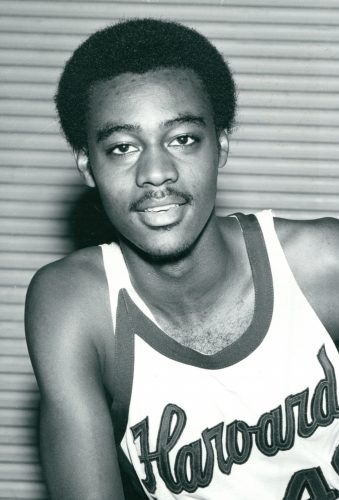
Ray McGuire photographed by Axel Dupeux.
Ray McGuire’s path from “the streets to the suites” is made-for-movie stuff.
Growing up poor and fatherless in Dayton, Ohio, he worked his way into the elite boarding school Hotchkiss, then Harvard for undergraduate, law and business degrees. He went into banking, rising to become vice-chairman at Citigroup and one of the highest-ranking Black executives on Wall Street.
In October, at 63, he quit to try his hand at politics. This time, he’s not starting from the bottom: He’s running for mayor of New York City.
Like most of the candidates in the Democratic pool, McGuire has no campaign experience or name recognition with average New Yorkers. He has just a few months to acclimate to the bare-knuckled world of New York City politics. What he does have is wealthy backers, who have pumped $5 million into his campaign; business experience, a selling point as the city tries to recover from the pandemic; a Spike Lee-produced campaign video; and an exceptional personal story.
You were recruited to First Boston, Merrill Lynch, Morgan Stanley and Citigroup. Have you ever had to apply for a job?
My first interview was for a job on Wall Street. When I got to the room, there was one person there. He said, “Listen, you’ve got five minutes. Shoot your best shot.” I said, “What do you want me to say?” He says, “You’ve got four minutes and 45 seconds.” I’m from the neighborhood. You don’t let anybody get up in your grill like that.
Read more
What was your pitch?
I said, “Harvard College, Harvard Law School and Harvard Business School pride themselves on taking the cream of the crop. I pride myself on being the film off the top of the cream.”
What was your childhood like?
I grew up in Dayton (Ohio), a proud son of a single mother. We grew up on the other side of the tracks, and my mother was a social worker. She and my maternal grandparents raised me and my two brothers. At any point we had a half a dozen foster children in our home. The paper mill [across the street] sometimes sent out fumes so strong, the only way we could breathe was to open the refrigerator door. Education was my ticket out.
You’re an outlier. Can you expect other people to succeed the way you did?
I shouldn’t be an outlier. I have spent a large part of my career making certain that even though I was a soul brother, S-O-U-L, I wasn’t the sole brother, S-O-L-E. Part of the pride that I take in 36 years in this business is to have extended the ladder, so that those others who had the skill set, who had the education, could have the opportunity to get into the room that I had.
I know the movers and shakers, man, from the streets to the suites.
You were in a very comfortable position, and you left it all to run for mayor. The chances of failure are pretty high.

(Ray McGuire via Flickr)
I love this city. This city is where I met my wife, where we’re raising our family. If I can take my lived experiences, and if I can take the leadership that I’ve evidenced every step of the way, and the relationships I have been able to develop, I can pull this city together. I can lead the greatest comeback, inclusive economic comeback, in the history of New York City.
The other thing is, I don’t owe anybody anything. Like the great Shirley Chisholm, I’m unbought, unbossed and unbound.
Well, you are not self-funding your campaign. You are taking donations. Not taking money from the real estate industry has become a calling card for some candidates.
I am prepared to take money from anybody whose interests are aligned with mine, which is the best interest of New York City. And let me tell you something, $5,100 [the maximum contribution allowed] isn’t going to change me.
Some will say, “He’s a wealthy banker, lives on Central Park West. What connection does he have to New Yorkers?”
I know what it’s like to have those little small kernels of the end of soap, and you put them together to convince yourself you’ve got a bar of soap. I know what it’s like to wash tinfoil. I know what it’s like when my mother debated whether or not to pay the power [bill] or put food on the table.
We cannot tax our way out of this. We must grow our way out of this.
In your campaign launch video you refer to making the city work “for everyone.” In what ways is that not happening right now?
The combination of George Floyd and Covid has unveiled what many of us lived: 400 years of systemic inequities. This has not been inclusive growth. We have divides in economics, health care, education, the carceral system. They’re only growing starker. It just took eight minutes and 46 seconds of a cold-blooded murder for us to say, “We’ve got to do something about it.”
After the financial crisis of the 1970s, the future of the city was in doubt. There was a focus on creating jobs. We created nearly a million, but didn’t build housing for average New Yorkers, so people gentrified neighborhoods. Suddenly jobs were deemed bad. The Amazon campus and the Industry City rezoning went down.
[The rejections of] Amazon HQ2 and Industry City would not have happened on my watch. Part of the reason is they didn’t include the community from the start, the culturally rich community that stood the risk of being displaced. You can’t come top-down. You have to make certain that you include all the constituents, especially the ones most at risk.
One of the reasons many New Yorkers have a negative impression of real estate is folks building 4,000-square-foot condos and selling them for $10 million, $50 million, $238 million. What will your plan be to build units where working-class and middle-class folks can live?
There was a period where we built 2.2 housing units per new job. Today, we build 0.5. The demand has so outpaced the supply that the prices have gone up. We need to change that so that we create truly affordable housing. People shouldn’t have to pay 60 to 70 percent of their income on rent. If this city is going to work, we all have to contribute, including the developers.
Mayor de Blasio’s housing policy is to upzone and require 25 percent or 30 percent of units be affordable. Critics say it hasn’t produced enough affordable units. Now rezonings are rejected, so the policy can’t even be implemented.
It hasn’t worked. We need to be more creative. We have underbuilt housing and overbuilt hotels. There are cities that have converted hotels to affordable housing. We should be able to do that here.
You’re a 6’4, 200-pound Black man. Your hands go up. You respond when the questions get asked.
You can’t build in New York City without being accused of furthering gentrification. How do you overcome that?
Gentrification is real. The whole complexion of these communities is changing, which is why I say for these projects to work you have to get the communities at the table, because they’re being displaced. Perception is reality in many of our communities.
Government is short on cash. That has revived talk of a pied-à-terre tax. We already have a millionaire’s tax in New York, but now we’re talking about a billionaire’s tax.
We cannot tax our way out of this. We must grow our way out of this. And those who have the resources, like me, are going to have to pay a little bit more. … And income tax is only 14 percent of the overall equation. So, a system that encourages [wealthy] people to leave is not going to help this city.
Do you have relationships with real estate executives in New York? Do you know the movers and shakers?
I knew the movers and shakers on [the] West 4th Street [basketball courts]. I know the movers and shakers of Riverside Park. I know the movers and shakers, man, from the streets to the suites. You have to have that range.
You have said, “Once I take off my suit and put on a sweatsuit, I could easily be George Floyd.” Have you had any negative experiences with police?
Very few Black people haven’t had an experience with the police. Three weeks ago, I get in a car, and we go two blocks. There’s a black driver, and there’s me. And there’s a police siren. Roll down the window, you’ve got two black guys in the car. “What are you guys doing?”
How do you handle that?
You’re a 6’4″, 200-pound Black man. Your hands go up. You respond when the questions get asked. You show no hostility. You show no movement of hands. You look directly in the eye, and no false moves. The result of which is we have no idea. The stories are out there. That’s our reality.
Some people have responded by saying, “Defund the police.”
I do not support the language of defund. There are very few Black people who will. I want the police to have a culture of what I call RAP: respectful, accountable and proportionate.
And we need to return to community policing, so that that relationship of trust can be restored.
You’re a bit of a basketball player, am I right?

(Ray McGuire via Flickr)
I’ve got a little game. [He averaged 28 points per game as a high school junior.]
Tell me about your family.
My wife [Crystal McCrary] is extraordinary. She was a lawyer. She is a documentary producer. She’s written three books. We have an 8-year-old [Leo]; he’s got a lot of game. We have an 18-year-old, Ella [McGuire’s stepdaughter]. She did extraordinarily well in school. She plays ball also. She just finished her applications to college. She’s great. And then we have a 20-year-old [Cole, McGuire’s stepson], who was a first-round draftee in the NBA for the Orlando Magic.
He’s the son of Greg Anthony, who played for the Knicks. Greg Anthony could walk down the street and people would know who he was. But people don’t know you. How will you introduce yourself to New York?
“I’m Ray McGuire, and I’m running for mayor.”
When people understand who I am, and the life I’ve lived, and what I’ve been able to accomplish, and the support that I’ve given … It’s all about the ladder. I look at the mentees … Ryan Williams at Cadre. Robert Reffkin at Compass. I was there at the start. I have so much pride in all they’ve been able to accomplish.
Most people don’t have that kind of social capital.
One of the things I committed to early on was to respond to every email and every voicemail, because I recognize how difficult it is to enter. I didn’t have a legacy. They call me up and years later they say, “You don’t remember me, but you returned my phone call, and I talked to you. You gave me a little time, and that guided my path.”
This interview has been edited and condensed for clarity.
